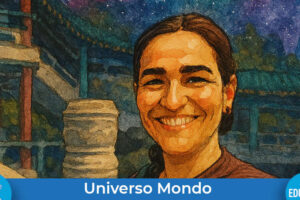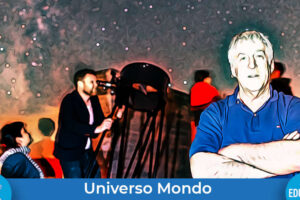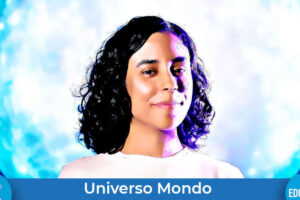Aggiornato il 28 Novembre 2024

Let’s start by talking about your path: why did you decide to dedicate yourself, alongside research, to many issues concerning the relationship between science and society?
I have wanted to be an astronomer since I was eight, so I have the privilege of doing a job that I love and have always dreamed of. It is a privilege to be a civil servant and to work for the Brazilian people as a university professor. Today, after many years, my work as an astronomer is a work with my head in the stars, but with people in mind. Sometimes I joke that, in addition to being an astrophysicist, I am also an “astro-pologist”.
There is a beautiful song by Caetano Veloso, a Brazilian singer that certainly many Italians know, which says: “Gente è pra brilhar, nà£o pra morrer de fome” (in English: people must shine, not starve). I like to say, with Caetano, that people are like the stars: they must shine, not starve.
When you become a professor in Brazil, you cannot lose sight of the ethical responsibility, because we live in a very unequal society. My personal trajectory is marked by issues of race, gender, class: I am the first to attend university in my family, who did not have access to formal education. I enter university in a country where most of the professors are white, mostly men and “from good families”. I don’t come here alone: “‹”‹my personal trajectory is marked by these social markers, which I carry with me in my practice and in my experience as an astrophysicist.

The Brazilian astronomical community is small but broad and well established. I was a member of the board of the Brazilian Astronomical Society between 2018 and 2020: we are about 900 people, including students. We have all main research areas: stellar astrophysics, extragalactic astrophysics, solar system physics, instrumentation, outreach and education.
The community has developed since the 1960s, and has since had access to observation time on telescopes and international collaborations. Although modest, it is an active, powerful community with large research centers in some universities. Of course, not as many as we would like, taking into account that ours is a continental country. But the situation in Brazil is not easy: we lack a well-organized scientific agenda with a constant flow of investments. Especially in recent years, we have had very drastic situations regarding the payment of scholarships for students (and also for some professors) and many research projects have been affected.
In this context, what are the main challenges related to science outreach and education. especially in astronomy?
The main problem in my opinion is the devaluation of outreach and education. The astronomical (and scientific) community in Brazil lacks an understanding of their role in society. They all agree on the need for outreach and education, and perhaps something has improved during the pandemic, but there are no projects, there is no appreciation of those who work in this role. For example, I am a researcher at university and I dedicate myself a lot to these activities: sometimes I receive criticism from colleagues who do not value this work. There is no maturity in the scientific community on these issues. We must organize ourselves to be able to carry out these activities professionally, we need a platform for science outreach and education at national level. It is also necessary to train educators and disseminators, and for this we need funding: “‹”‹our training in physics and astronomy does not prepare us to work in a planetarium, in a museum, in the media, on social networks.
Unless we recognise the importance of these roles, there is no way to convince society to support major projects, such as joining ESO (Brazil’s accession to ESO, approved in 2010, was never ratified by the congress, and the negotiations were interrupted in 2018, ed).
What does it mean to spend billions of reais (the Brazilian currency, ed) on a collaboration dedicated to building telescopes and astronomical research, in an extremely unequal society like ours? We need a robust outreach and education project, and we are still a long way from this. Just think that less than 20% of physics teachers have a licenciatura (degree with a specialization in teaching, ed) in physics. It’s a tragedy: it means that most people don’t get a decent training in physics and astronomy at school. Our fellow astronomers understand the importance of all this but do not do much to change things. I believe we still have a long way to go.

Can you tell us about your outreach and education projects?
In recent years, I have been engaged with teaching science from an intercultural perspective: I have worked with quilombolas schools (quilombos are historical black communities in Brazil, ed) and in indigenous communities, and I have rethought science teaching from a gender perspective, thinking about excluded bodies ““ female, black, indigenous, LGBT bodies.
I work in different ways: by asking the questions of contemporary science, but also with historical and philosophical questions, or by using astrophysics laboratories to develop skills and competences such as computational thinking and artificial intelligence. And then there is the cultural perspective: what is science at the end of the day? How can we recognize the knowledge and actions that exist in the quilombolas communities, in the indigenous communities, in the Brazilian suburbs, the scientific and technological power that exists in these places but is not recognized, in modern logic, as knowledge production?
For me it is not a matter of denying science but of decolonizing it: recognizing that science is human, therefore collective, and that we must all take part in this process. Science is important for the development of critical thinking, especially in an unequal society like ours. I am thinking of Hannah Arendt: the exercise of critical thinking is the starting point for an intercultural and emancipatory education, which allows people to live critically, make informed decisions. This is my big goal. And since Brazil is a racist country, in the process of dialogue between astronomy and black communities, indigenous communities, I work towards an anti-racist and anti-sexist astronomy education.

The indigenous Brazilian constellation Ema, or Guirà¡ Nhandu in Guaranà language (in English: greater rhea, a South American bird similar to the ostrich and the Australian emu). In the second half of June, when it rises just after sunset, it indicates the beginning of winter for indigenous people of southern Brazil and the beginning of the dry season for indigenous people of northern Brazil. It is located in the region of the sky limited by the western constellations of Crux, the Southern Cross, and Scorpio; it also includes stars of the constellations Musca, Centaurus, Triangulum Australe, Ara, Telescopium, Lupus and Circinus. Credits: Germano Bruno Afonso (Telescópios na Escola, Rio de Janeiro, 2013)
Can you explain what quilombos are and what your work with these communities consists of?
Quilombos have been communities of black struggle and resistance in Brazil for centuries, and they still fight today for the right to land and citizenship. They are a legacy of the slavery system that lasted at least 350 years: black people were kidnapped, brought to Brazil and enslaved in the Portuguese colonization project. After independence, there was the liberation of enslaved people on May 13, 1888: think how it must have been on May 14 for these people, who had nowhere to live, no access to land. For a long time, access to formal education was prohibited. The quilombos are what remains of this struggle from an ancestral perspective, but in a certain sense the favelas, the great areas of poverty in Brazil, are also contemporary quilombos.
I have worked with quilombola schools in Porto Alegre in southern Brazil, and we now have a national research project where we are analyzing these schools across the country. The project is called “Zumbi-Dandara dos Palmares”, in homage to Zumbi, the black hero of Quilombo dos Palmares, the most famous of Brazil, several centuries ago, and Dandara, one of the women who fought with him. It involves professors and researchers from different areas ““ history, geography, education ““ together with social movements and quilombola communities.
We work together, we build maps of the territory ““ the quilombola question is very much linked to the territory ““ and we try to understand how the sense of identity is built and strengthened starting from this political perspective.
It’s a work based on dialogue ““ we meet often, even now with the pandemic, in a controlled way ““ and data analysis: here I bring the tools and the working model of astrophysics, the analysis of big data, a perspective that is absent in the humanities. We do statistical analysis of public databases on schooling, which no one is studying in this way, to quantitatively show that quilombola schools do not have internet, computers, access to water, that there are no teachers, that there is school dropout. The final goal of the project is science education, but this preparation process is necessary first.
How do you reconcile these activities with the research and teaching work?
The university model in Brazil offers great freedom to create new things. I teach courses, guide and supervise masters and doctoral students, and consider this job as part of my research, teaching and dissemination experience. My outreach and education projects involve Masters and PhD students: it’s a training process, we bring something to these communities but at the same time we learn together with them. One of my first graduate students has just completed his thesis, a historical reconstruction of the life of Cecilia Payne (an Anglo-American astrophysicist, ed), another one is working on racial issues.
I’m not an astrophysicist just to produce articles for Astronomy & Astrophysics, Astrophysical Journal or Monthly Notices of the Royal Astronomical Society (three of the most prestigious astronomy journals, ed). I am an astrophysicist who needs to work with education, outreach, culture, art: I like to mix disciplines because my head works like this, because of my path.
I believe that the university is a place of creation, and I know that I am creating something new and important in Brazil: an anti-racist and anti-sexist education, in a “dry” field like astronomy. As university professors we have prestige, we are listened to, and we have the power to create new curricula. I use cultural astronomy to talk about scientific racism, which is a pseudo-science but is very active in public policy: it’s what makes public schools, which are mainly attended by black and poor people, remain as they are.
In my opinion, the greatest responsibility in the university is the training of future scientists and teachers. We are not just supervisors: we are mentors, we train people. If we do not do it here, at the university, we will not change society, especially in a country like Brazil, where the university does not yet have the face of the country, which is black.

How is this work received by the students?
Students love this type of work. The main difficulties are with some colleagues, especially in my own department. In other institutes and faculties, in other universities, colleagues recognize this work, and at national level it is increasingly appreciated: I was invited for a very important national project, last year I received an award from the Legislative Assembly of the State of Rio Grande do Sul for my work on anti-racist education, and my book Astrofàsica para a educaà§à£o bà¡sica: A Origem dos Elementos Quàmicos no Universo (in English: Astronomy for primary education: the origin of chemical elements in the Universe) was finalist for the 2020 Jabuti Prize, the most famous Brazilian literary prize.
I do not seek such recognition, but it makes me happy to work with students, to train them in the awareness of inequalities. Students are my main focus: they are the generation that will build the Brazil of tomorrow. It’s a long-term project, we’re planting seeds. I don’t care so much about today, but in the future I’m sure that people will read what I write and understand the impact of these projects on people’s way of thinking. Perhaps this is also why there is a lot of resistance.

Paulo Freire was the greatest Brazilian educator and one of the greatest thinkers in the world: think about the Pedagogy of the oppressed and above all of the Pedagogy of Hope, a beautiful book. The first time I approached his work at the university, I immediately identified myself in his discourse on education as liberation, as emancipation.
In my dialogue with Paulo Freire, it is worth mentioning that he was greatly influenced by the ideas of Frantz Fanon, the great black thinker, in particular in the Pedagogy of Indignation, one of Freire’s lesser known books. bell hooks also made very interesting criticisms of Paulo Freire’s thought, in particular on the concept of empowerment ““ I don’t know whether it is used in Italy, but it is widely used in the United States and Brazil. It is no coincidence that our current policy seeks to destroy his legacy. But they will not succeed: his thought is resilient, alive, pulsating. I use his ideas a lot, they are very original.
How do you use Paulo Freire’s pedagogy, in particular in the context of science education?
For me science is historical, localized in space and time: it is dynamic, not static, and above all it is human. The humanization of science is everything in Paulo Freire’s pedagogy. His pedagogy is for human beings who need to be emancipated through thought, through a critical, quality education, not a “banking” education that manipulates them. This is exactly what we are looking for in science: critical people who are not fooled by fake news and conspiracy theories.
In our age, in the twenty-first century, Paulo Freire is ever more necessary. In today’s Brazil, where we are experiencing a dystopia, with a health crisis that has exterminated half a million people, Paulo Freire’s pedagogy is the pedagogy of utopia, of hope: a practical, active hope. I think about the relationship between theory and practice in Paulo Freire, and then I look at science and I see our way of working with theory and practice, the way we weigh experiments with theory. It is very natural for me to bring Paulo Freire into science teaching.
Another important thing that I like about his pedagogy is the issue of dialogue: arguing, talking is what we want in science to expand and strengthen perspectives on the world. In physics and astronomy, we are absorbed in the discourse of meritocracy: Paulo Freire dismantles it completely when he discusses the humanization of science. Scientific racism has dehumanized black bodies, it took their humanity away in order to enslave them.
My anti-racist education is in dialogue all the time with Paulo Freire ““ even if his focus was not race, but as I said he was very influenced by Fanon and black thought. Of course he was a white man, from a good family, he did not come from the working class, but he had great attention to others. I really like his sensitivity.
What other thinkers have influenced you?
Many, especially black thinkers: I have already mentioned Frantz Fanon and bell hooks, and then Brazilian black thinkers such as Beatriz Nascimento, Sueli Carneiro, Abdias do Nascimento, Muniz Sodrè, author of a very beautiful book, Reinventando a educacà£o (in English: Reinventing Education). Also indigenous thinker Davi Kopenawa Yanomami, who wrote a very interesting book, The Fall of the Sky, on the cosmology of the Yanomami people of the Amazon region. I was greatly influenced also by African thinkers such as Cheikh Anta Diop, who studied physics with Frèdèric Joliot-Curie, Marie Curie‘s son-in-law, and made interesting contributions to physics and mathematics; Achille Mbembe, a wonderful thinker, who builds up on many ideas already developed here in Brazil in the 1970s by Sueli Carneiro and Abdias do Nascimento; Kabengele Munanga, an anthropologist who has lived in Brazil for many years. I also like Michel Foucault and his idea of “‹”‹power.

I already mentioned the book Astrofàsica para a educaà§à£o bà¡sica, finalist at the Jabuti Prize 2020. Last year I published a fiction book for young adults, Antà´nia e a caà§a ao tesouro cósmico (in English: Antà´nia and the cosmic treasure hunt), which is running for this year’s Jabuti Award: Antà´nia is a black girl from rural Brazil, and her hair holds the secret of the universe ““ I work with the idea of Afro-textured hair, since there are many prejudices about it in Brazil. At the end of the book there is a one-page story for younger children, which will be released next year in the form of an illustrated book.
Another book should also be released by the end of the year: Kayodè, o caà§ador de historias (in English: Kayodè: the story hunter), an Afrofuturist book about the Yoruba culture, an important component of Afro-Brazilian culture, with elements of science outreach.
And I just published a new book, Astro-antropológicas, a free e-book that will soon be out in English too. It is a collection of reflections on Covid-19, on the nature of science, the role of women and black bodies, colonialism, artificial intelligence, under an anthropological perspective. As Claude Lèvi-Strauss wrote: “The anthropologist is the astronomer of the social sciences: his task is to discover a meaning for configurations which, owing to their size and remoteness, are very different from those within the observer’s immediate purview”. The book is a dialogue between astronomy and African, Afro-Brazilian, indigenous, gender and LGBT issues, all accompanied by the images of APOD ““ the Astronomy Picture of the Day.




Add Comment